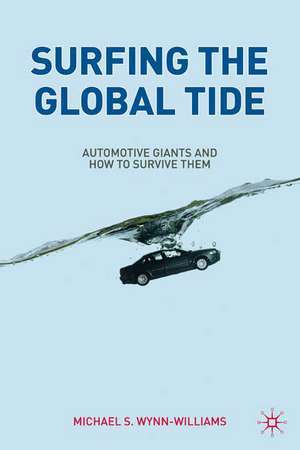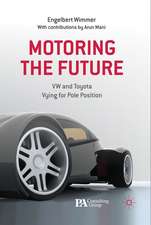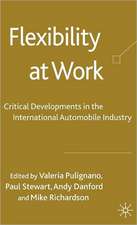Surfing the Global Tide: Automotive Giants and How to Survive Them
Autor M. Wynn-Williamsen Limba Engleză Hardback – 22 apr 2009
| Toate formatele și edițiile | Preț | Express |
|---|---|---|
| Paperback (1) | 387.38 lei 6-8 săpt. | |
| Palgrave Macmillan UK – 22 apr 2009 | 387.38 lei 6-8 săpt. | |
| Hardback (1) | 394.51 lei 6-8 săpt. | |
| Palgrave Macmillan UK – 22 apr 2009 | 394.51 lei 6-8 săpt. |
Preț: 394.51 lei
Nou
Puncte Express: 592
Preț estimativ în valută:
75.49€ • 79.03$ • 62.46£
75.49€ • 79.03$ • 62.46£
Carte tipărită la comandă
Livrare economică 07-21 aprilie
Preluare comenzi: 021 569.72.76
Specificații
ISBN-13: 9780230579248
ISBN-10: 0230579248
Pagini: 271
Ilustrații: XII, 271 p.
Dimensiuni: 155 x 235 x 22 mm
Greutate: 0.57 kg
Ediția:2009
Editura: Palgrave Macmillan UK
Colecția Palgrave Macmillan
Locul publicării:London, United Kingdom
ISBN-10: 0230579248
Pagini: 271
Ilustrații: XII, 271 p.
Dimensiuni: 155 x 235 x 22 mm
Greutate: 0.57 kg
Ediția:2009
Editura: Palgrave Macmillan UK
Colecția Palgrave Macmillan
Locul publicării:London, United Kingdom
Cuprins
Raising the Leviathan Fundamentals of Scale Economies of Size Production Costs Survivor Analysis Economies of Scale in the Automobile Industry Survivor Analysis in the Automobile Industry From Plant Size to Economies of Scale Conclusion Structuring the Firm Company Structure Unitary and Multidivisional Governance Structures Constructing the Automobile Industry Paradigm Paradigm Revolutions Constructing the Automobile Industry Paradigm Vertical Integration of the Automobile Paradigm Resultant Size and Shape Conclusion Approximating to the Automobile Industry Paradigm Introduction Sub-scale Production Internal Approximations to the Automobile Paradigm External Approximations to the Automobile Paradigm Opportunities Raised by Globalization Reassessing the Full-function Structure Conclusion Opening the Door to China The Rise and Fall of British Leyland/Rover Group MG Rover: Autonomy and Sustainability MG Rover Assets: Reconstructing the International Vertical Joint Venture Conclusion The Paradigm in the Automobile Industry of the Future Current State of the Industry Reaching Beyond the Automobile Industry Paradigm Paradigmatic Views of Other Industries Closing Remarks References
Recenzii
'This book is a highly interesting historical, economic, and conceptual analysis of the automobile industry from a 'paradigmatic' perspective. It explains in great detail how scale and structure of car companies worldwide are determined by economies of scale and a certain extent of vertical integration. It also shows the limits of the present 'Budd' paradigm and provides an outlook to alternatives. This book is highly recommended for those interested in cars (nearly all of us), especially in this time of economic crisis that has great impact on the car industry as we know it.' - Philip J. Vergragt Ph.D, Professor Emeritus of Technology Assessment, Senior Associate, Tellus Institute
'Surfing the Global Tide' is an important book at an important time. With automakers worldwide being battered by the global financial crisis, speculation abounds about consolidation, realignment and bankruptcy. Wynn-Williams' ambitious work applies to any company on the edge. In pinpointing the minimum size a carmaker must be to survive on its own, his research draws richly from both the theories of economics and the realities of the factory floor. His answer is that successful automakers can churn out a surprisingly low number of vehicles per year. The implications are broad reaching for a range of manufacturers, from Japan's Mazda Motor Corp. and Germany's Daimler AG to the nascent Chinese brands. 'Surfing' is fascinating read for anyone interested in the future path of the globalized auto industry.' - Hans Greimel, Asia Editor, Automotive News
'Surfing the Global Tide' is an important book at an important time. With automakers worldwide being battered by the global financial crisis, speculation abounds about consolidation, realignment and bankruptcy. Wynn-Williams' ambitious work applies to any company on the edge. In pinpointing the minimum size a carmaker must be to survive on its own, his research draws richly from both the theories of economics and the realities of the factory floor. His answer is that successful automakers can churn out a surprisingly low number of vehicles per year. The implications are broad reaching for a range of manufacturers, from Japan's Mazda Motor Corp. and Germany's Daimler AG to the nascent Chinese brands. 'Surfing' is fascinating read for anyone interested in the future path of the globalized auto industry.' - Hans Greimel, Asia Editor, Automotive News
Notă biografică
MICHAEL WYNN-WILLIAMS is currently the Senior Analyst (Japan and South Korea) for IHS Global Insight and has extensive experience of the automobile industry in both a professional and academic capacity. He holds a PhD in automotive economics from Cardiff Business School and an MBA from Heriot-Watt University.













